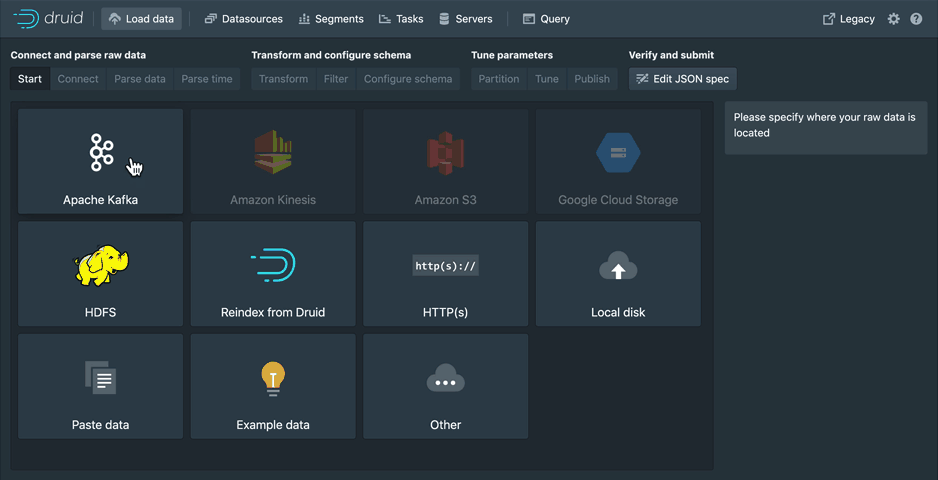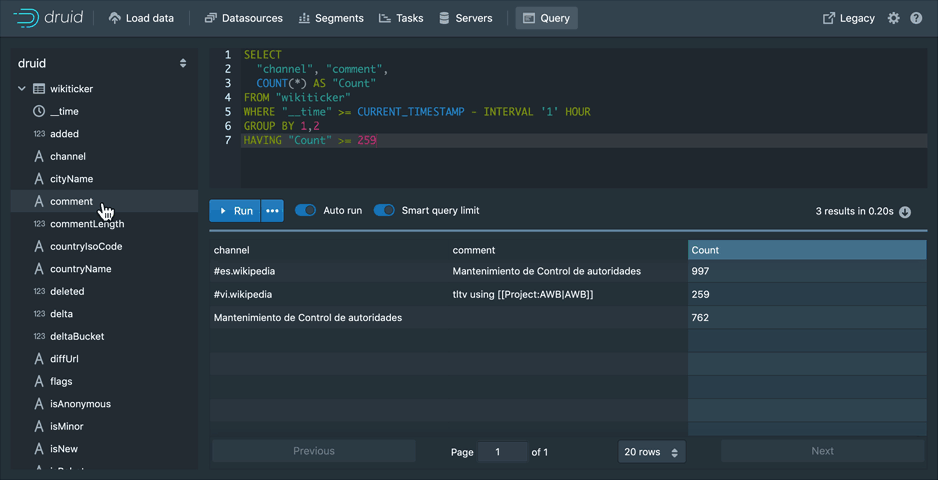* SQL: Use timestamp_floor when granularity is not safe. PR #12944 added a check at the execution layer to avoid materializing excessive amounts of time-granular buckets. This patch modifies the SQL planner to avoid generating queries that would throw such errors, by switching certain plans to use the timestamp_floor function instead of granularities. This applies both to the Timeseries query type, and the GroupBy timestampResultFieldGranularity feature. The patch also goes one step further: we switch to timestamp_floor not just in the ETERNITY + non-ALL case, but also if the estimated number of time-granular buckets exceeds 100,000. Finally, the patch modifies the timestampResultFieldGranularity field to consistently be a String rather than a Granularity. This ensures that it can be round-trip serialized and deserialized, which is useful when trying to execute the results of "EXPLAIN PLAN FOR" with GroupBy queries that use the timestampResultFieldGranularity feature. * Fix test, address PR comments. * Fix ControllerImpl. * Fix test. * Fix unused import.
Website | Twitter | Download | Get Started | Documentation | Community | Build | Contribute | License
Apache Druid
Druid is a high performance real-time analytics database. Druid's main value add is to reduce time to insight and action.
Druid is designed for workflows where fast queries and ingest really matter. Druid excels at powering UIs, running operational (ad-hoc) queries, or handling high concurrency. Consider Druid as an open source alternative to data warehouses for a variety of use cases. The design documentation explains the key concepts.
Getting started
You can get started with Druid with our local or Docker quickstart.
Druid provides a rich set of APIs (via HTTP and JDBC) for loading, managing, and querying your data. You can also interact with Druid via the built-in web console (shown below).
Load data
Load streaming and batch data using a point-and-click wizard to guide you through ingestion setup. Monitor one off tasks and ingestion supervisors.
Manage the cluster
Manage your cluster with ease. Get a view of your datasources, segments, ingestion tasks, and services from one convenient location. All powered by SQL systems tables, allowing you to see the underlying query for each view.
Issue queries
Use the built-in query workbench to prototype DruidSQL and native queries or connect one of the many tools that help you make the most out of Druid.
Documentation
See the latest documentation for the documentation for the current official release. If you need information on a previous release, you can browse previous releases documentation.
Make documentation and tutorials updates in /docs using MarkDown and contribute them using a pull request.
Community
Visit the official project community page to read about getting involved in contributing to Apache Druid, and how we help one another use and operate Druid.
- Druid users can find help in the
druid-usermailing list on Google Groups, and have more technical conversations in#troubleshootingon Slack. - Druid development discussions take place in the
druid-devmailing list (dev@druid.apache.org). Subscribe by emailing dev-subscribe@druid.apache.org. For live conversations, join the#devchannel on Slack.
Check out the official community page for details of how to join the community Slack channels.
Find articles written by community members and a calendar of upcoming events on the project site - contribute your own events and articles by submitting a PR in the apache/druid-website-src repository.
Building from source
Please note that JDK 8 or JDK 11 is required to build Druid.
See the latest build guide for instructions on building Apache Druid from source.
Contributing
Please follow the community guidelines for contributing.
For instructions on setting up IntelliJ dev/intellij-setup.md






